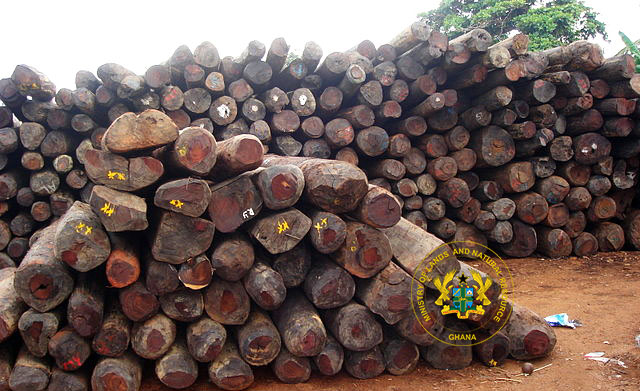ADF STAFF
Ghana banned rosewood logging in 2019. Despite that, logging continues, driven by China’s insatiable appetite for the lumber and the substantial amounts of money Chinese logging companies spread around in some of Ghana’s poorest communities.
As recently as 2021, Ghana exported more than $2 million worth of endangered rosewood logs to China. A Chinese logging interest in Ghana’s Yipala community operated until late 2021, according to experts who visited the site.
In April 2023, investigators with GH Environment found illegal rosewood logging underway in Damongo, the capital of Ghana’s Savannah region. By some estimates, more than 6 million rosewood trees have been logged in Ghana since 2012, despite various bans that have been imposed since then.
“Not only in the Savannah area but in the entire Northern belt of the country, illegal logging of rosewood is still rampant,” GH Environment researchers wrote recently.
Investigators met a chainsaw operator in the Damongo area who told them he could help them get rosewood.
“It is true the government has banned the cutting and processing of rosewood,” the unnamed worker told GH Environment. “But it is a business we can’t stop doing as the money is big, so we go into hiding and cut them for those who need the wood.”
Rosewood grows in some of the country’s poorest areas, where more than two-thirds of the population live in extreme poverty, defined as living on less than $1 per day.
Chinese logging companies pay local loggers up to $32 for every cubic meter of rosewood they harvest. Further along the supply chain, local merchants can earn up to $130 per cubic meter.
“Even if you are a saint, you will be tempted to join in considering your impoverished state,” William K. Dumenu, a researcher with the Forestry Research Institute of Ghana, wrote for the website Kasa. “Since most of us are not saints, what can we expect?”
Observers say Chinese companies also use their financial leverage to exploit Ghana’s legal system that lets loggers salvage downed or dead trees.
In 2010, Ghanaian government officials issued salvage permits to Chinese construction companies hired to build a road near Mole, Ghana’s largest national park. That permit posed a major threat to Mole’s rosewood, according to the Environmental Investigation Agency.
“Companies gladly received the permits knowing that the permit is just a pass to ‘lawfully but awfully’ harvest as much as they can,” Dumenu wrote.
Chinese companies often acquire salvage permits then ignore the conditions they impose, such as clearing land for development or removing abandoned trees.
Despite those conditions, some letters given to companies to salvage rosewood revealed that none of the salvage conditions had been met, according to Dumenu.
Chinese logging companies caught breaking the law typically pay small fines to escape further punishment.
That’s not always the case, however. In 2019, Ghana arrested Chinese national Helena Huang, known as the “Rosewood Queen,” for illegally processing rosewood at a factory in Yipala. Huang skipped bail, was rearrested and deported to China instead of being prosecuted.
Huang’s story appears to be the exception rather than the rule when it comes to illegal rosewood logging in Ghana.
Extreme poverty in northern Ghana lets Chinese companies exploit the people and the trees by supporting an entire economy of loggers, transporters and middlemen connecting the Ghanaian forests with Chinese furniture makers, Dumenu wrote.
“Indeed, so long as there is widespread poverty, few economic opportunities, [and] inadequate social intervention programs to address the poverty and livelihood needs in rosewood endemic areas, it will be difficult to keep them off the resources,” he added.

